Read the story that accompanies this photo essay, “No Address, No Rest: Berkeley Forces Vehicle Dwellers to Keep Rolling,” which is part of the “Driving Home: Surviving the Housing Crisis” project. Lee esta historia en español.
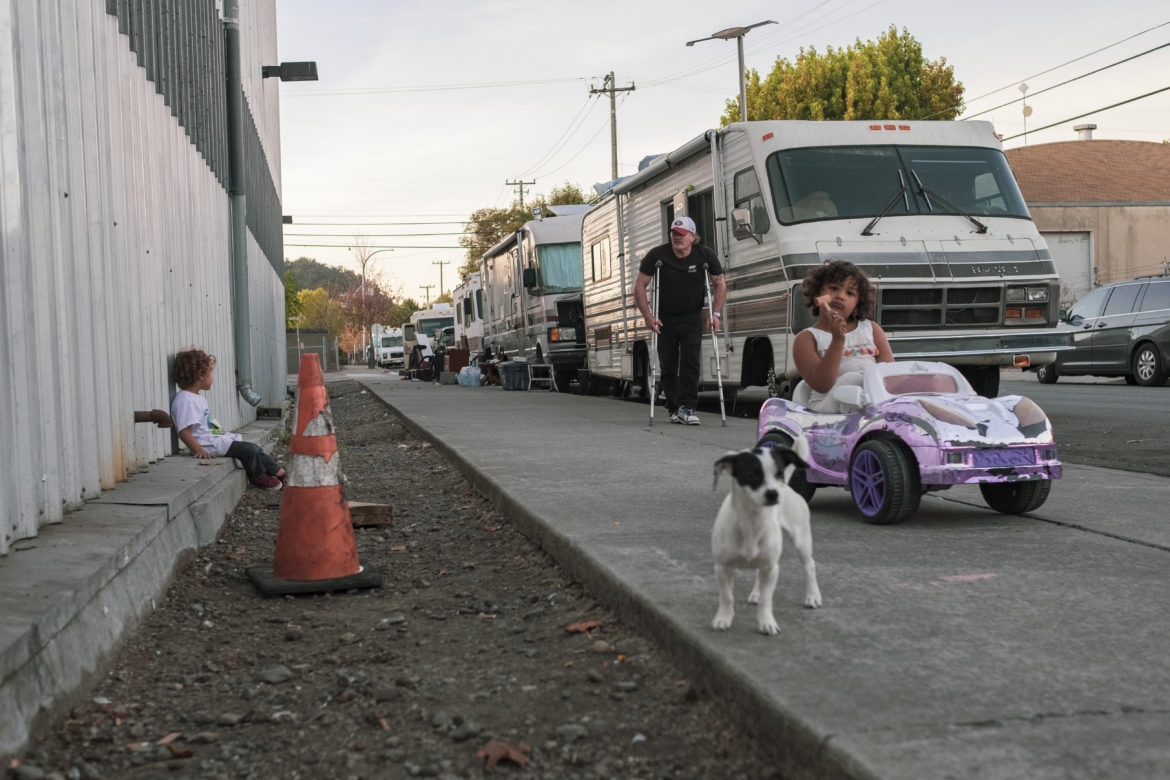
Yesica Prado / San Francisco Public Press and CatchLight Local
On a Sunday afternoon, children play in the Gilman District in West Berkeley. Their family is part of a community of vehicle residents called Friends on Wheels, whose members have parked and lived together for two years. The community is made up of families, students, gig workers, service workers and disabled and elderly people who live in all shapes and sizes of vehicles.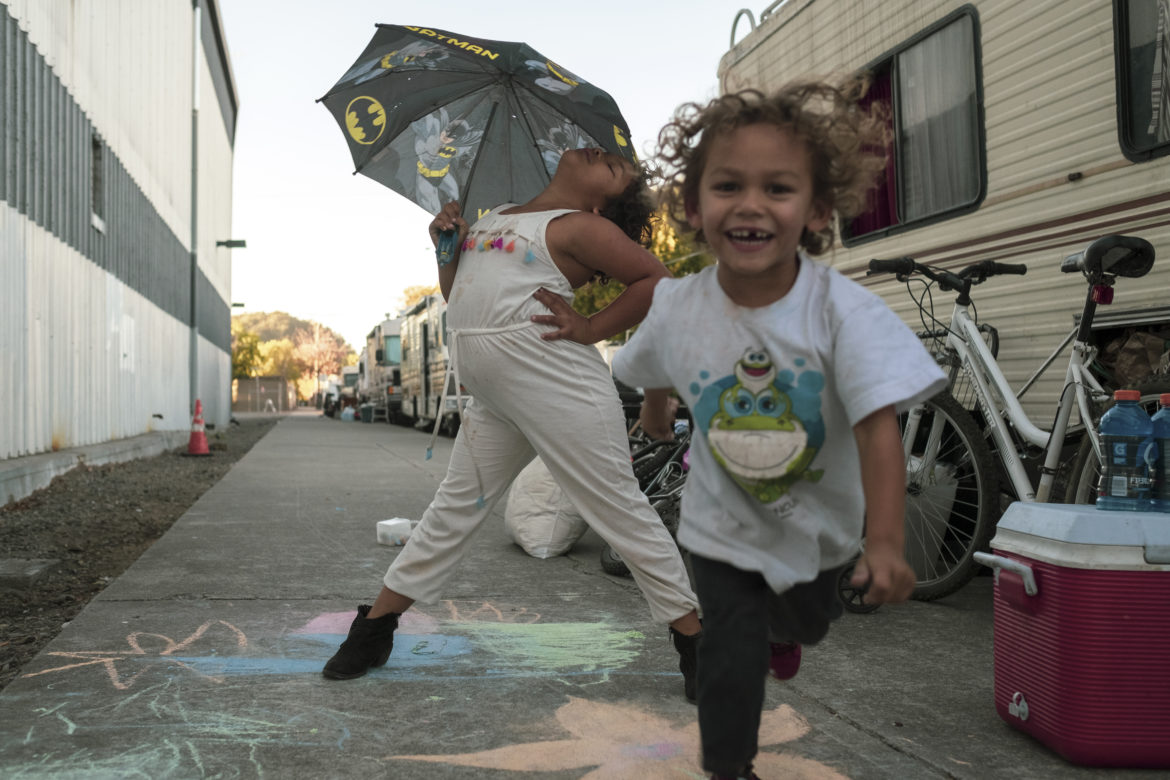
Yesica Prado / San Francisco Public Press and CatchLight Local
Children play on Eighth Street in West Berkeley while their parents run errands. RV-dwelling neighbors or grandma babysit when the guardians are away. The kids fill the block with laughter and toys as they run up and down the line of vehicles, peeking inside neighbors’ doors to say hello.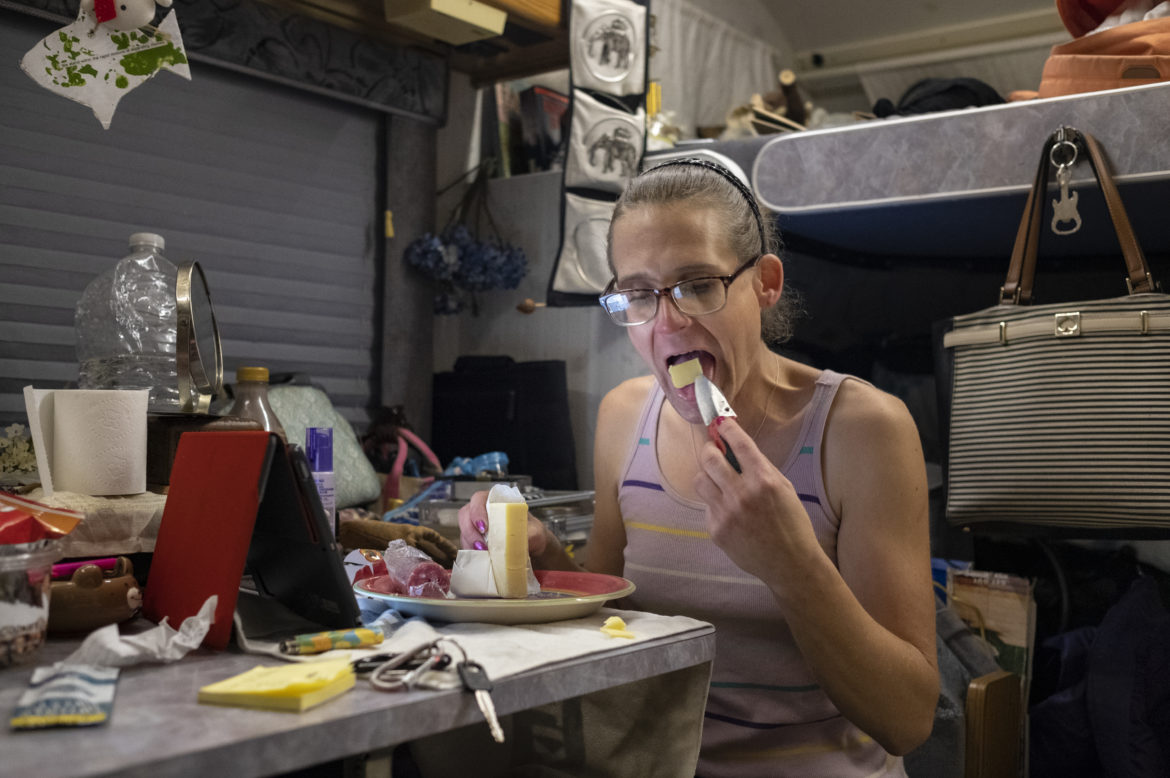
Yesica Prado / San Francisco Public Press and CatchLight Local
Chloe Verron cuts a piece of cheese and eats it with her pocketknife in the vehicle of a friend where she lives temporarily. Verron lived in a 22-foot RV before parking enforcement towed it for expired registration. The fees added up to more than $3,000. After the vehicle went unclaimed for 30 days, it was put up for auction. Unable to afford to buy back her home, Verron has been couch surfing with members of the community until she can save up enough to buy another vehicle. But saving money is a challenge, as she is unable to work while undergoing hormone treatment. Before Verron became unhoused, she rented a house in Lake County, near the Mendocino National Forest, after leaving a stressful computer programing job with design firm Curran & Connors in New York.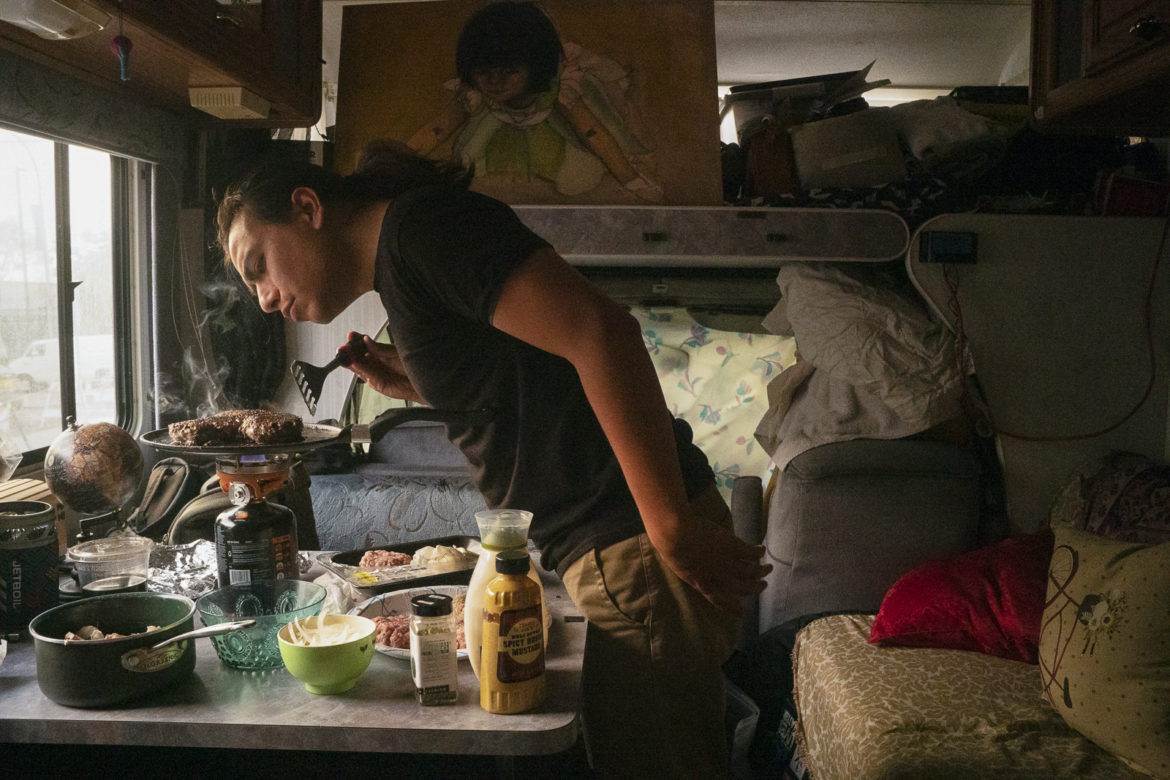
Yesica Prado / San Francisco Public Press and CatchLight Local
Christian Torres cooks hamburgers on a camping stove. Torres lives inside a Ford E150 white cargo van. He is a photographer from the town of Sanger, near Fresno. He brought his van to the Bay Area, searching for creative opportunities. His daily routine: make breakfast, hit the gym, shower, commute around the city for food and linger at coffee shops or libraries to charge battery packs and electronics for the day.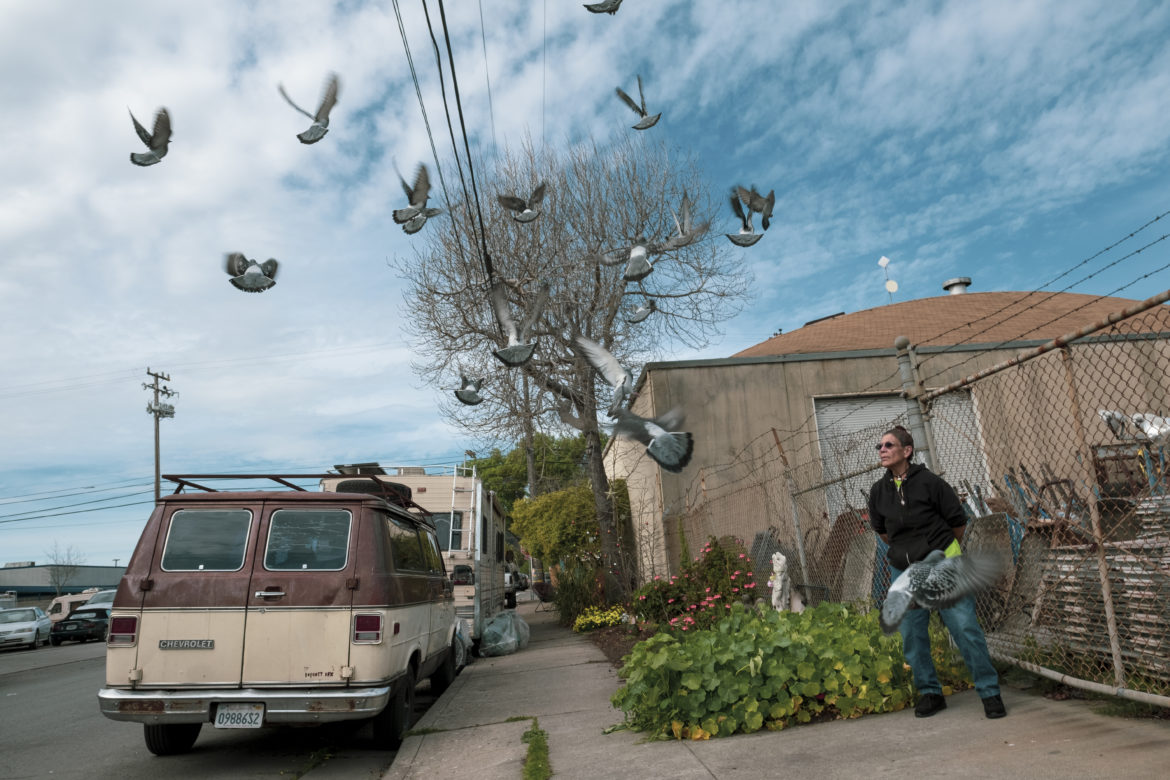
Yesica Prado / San Francisco Public Press and CatchLight Local
Merced Dominguez watches the pigeons fly over her garden on Eighth Street. “Every day, they follow me wherever I go,” said Dominguez, throwing birdseed into the driveway. “All the way to the Dollar Tree and back home. They are just waiting for me to feed them.” Dominguez’s regular routine involves setting out food and water on the driveway for stray animals that visit the block, including a street cat she named Cookie and the dozens of pigeons that show up twice a day.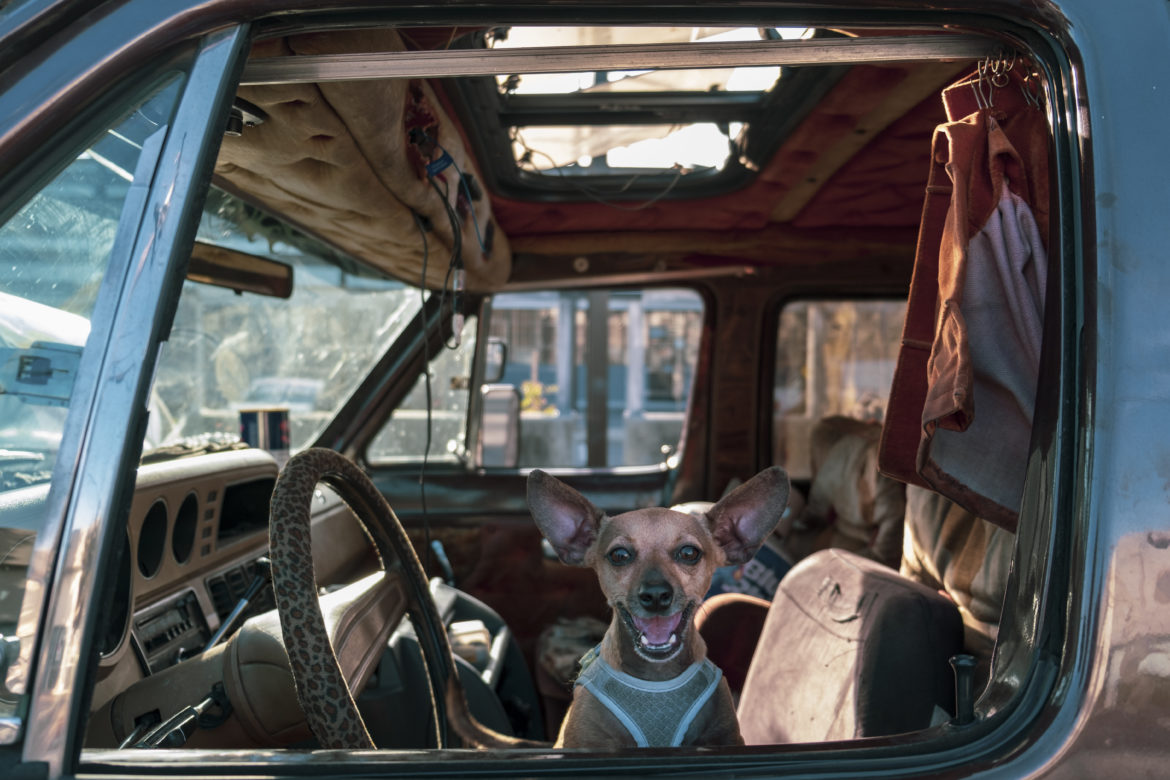
Yesica Prado / San Francisco Public Press and CatchLight Local
Amber Whitson’s Chihuahua, Bit, peeks out her van’s window on a Saturday afternoon. While tiny, Bit is fearless and protective of Whitson, barking at every pedestrian. Among vehicle dwellers in Berkeley, dogs and cats offer comforting companionship and protection. Some pet owners find it easier to live in a vehicle, as many landlords either ban or charge extra for animals, adding yet another obstacle to affordable housing.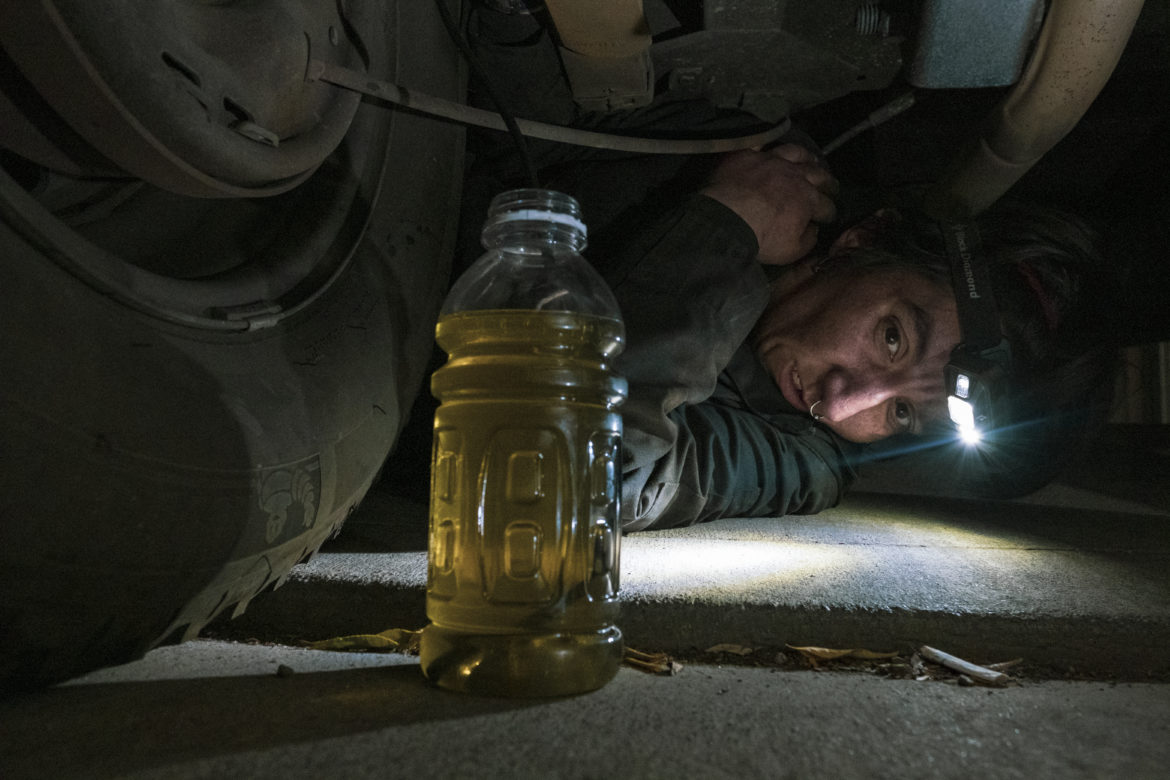
Yesica Prado / San Francisco Public Press and CatchLight Local
Amber Whitson crawls under her 1988 Dodge van to drain brake fluid. Whitson is a self-taught mechanic who offers affordable services to other vehicle residents. She often works at night and loses sleep, but repairing vehicles late at night draws less attention. In Berkeley, it’s illegal to repair vehicles on public streets except in emergencies. Violators of the ordinance face fines and possible towing.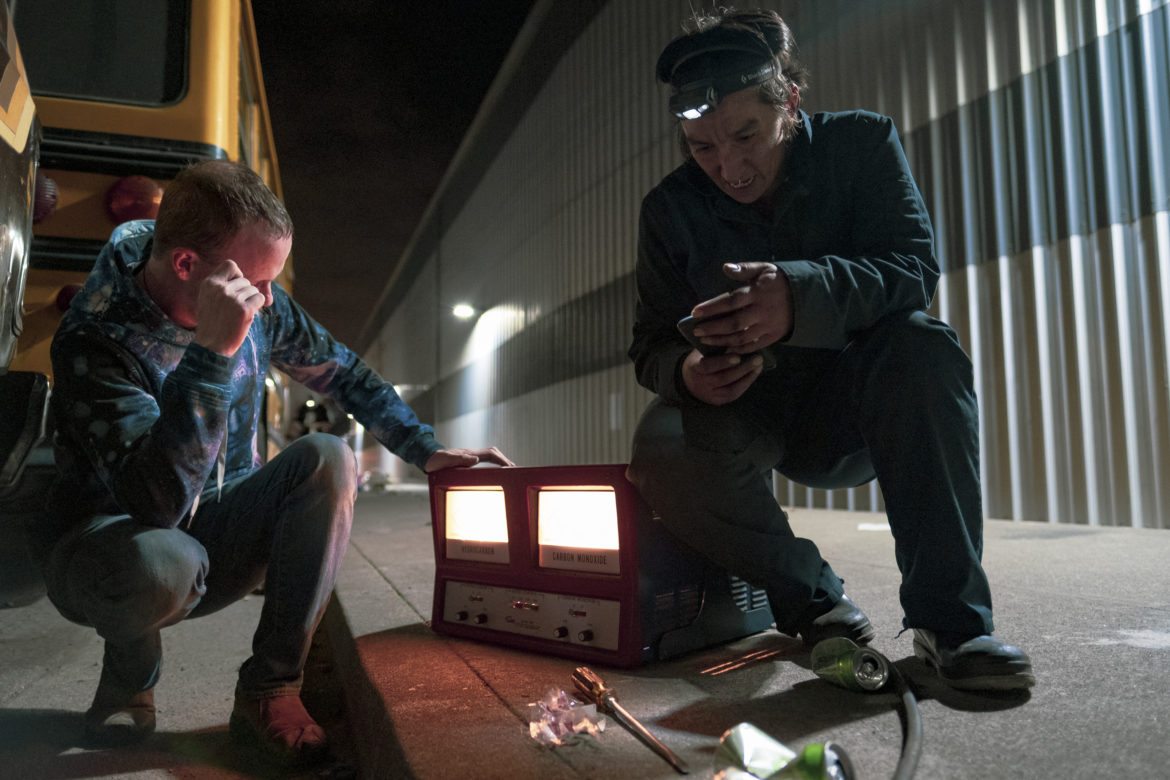
Yesica Prado / San Francisco Public Press and CatchLight Local
Amber Whitson, right, browses her phone for instructions to repair an old smog-testing machine, which she found at a warehouse auction in February. Whitson says she hopes to test engines for vehicle dwellers before sending them to get tested officially. Often the biggest challenge for vehicle residents is passing the state’s smog test, which they need to reregister and avoid getting towed for expired tags.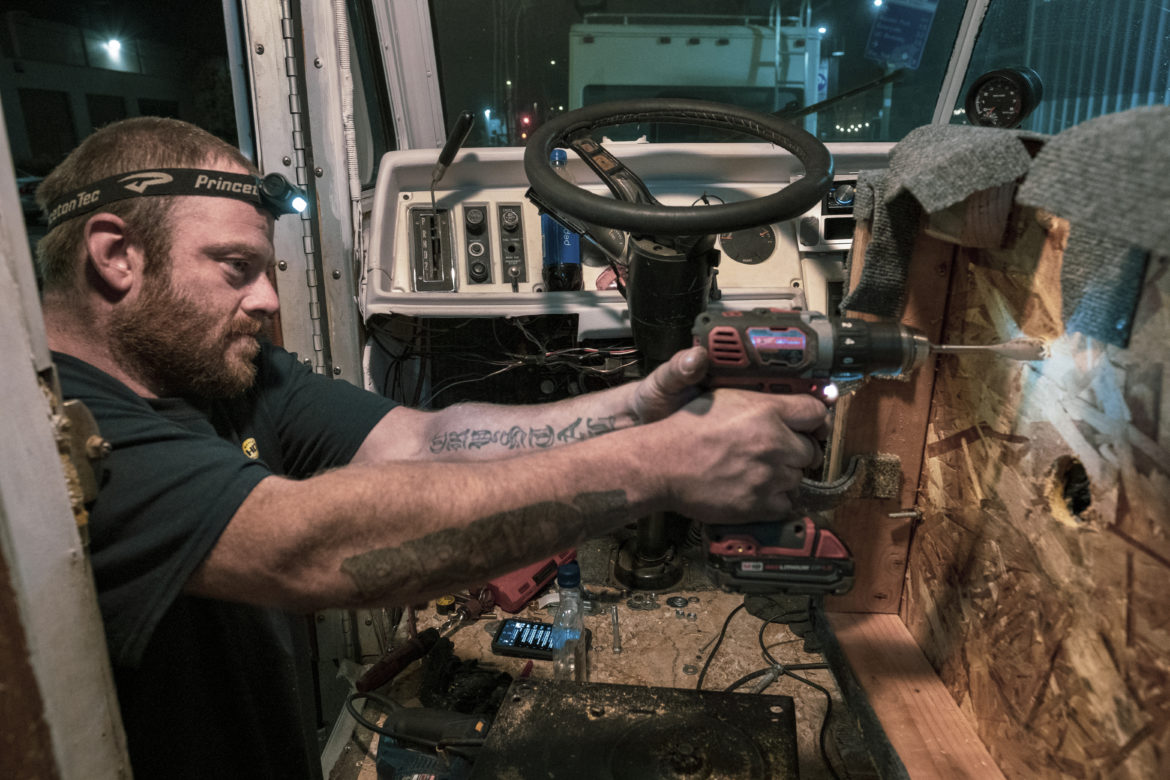
Yesica Prado / San Francisco Public Press and CatchLight Local
Chris Castle drills a hole in his driver’s seat one Saturday night. Castle built a base for the seat with found materials from a nearby dumpster to save money. Often, Castle repurposes or repairs objects he finds while hunting around town for items to recycle in exchange for cash.
Yesica Prado / San Francisco Public Press and CatchLight Local
Ryan Maddry sits in his recreational vehicle waiting for his cat, named Dog, to come inside before going to bed in late February. After living in a tent for months at the Here/There Community camp, he purchased an RV as a step toward stable housing. He named his vehicle “Ole Gal.”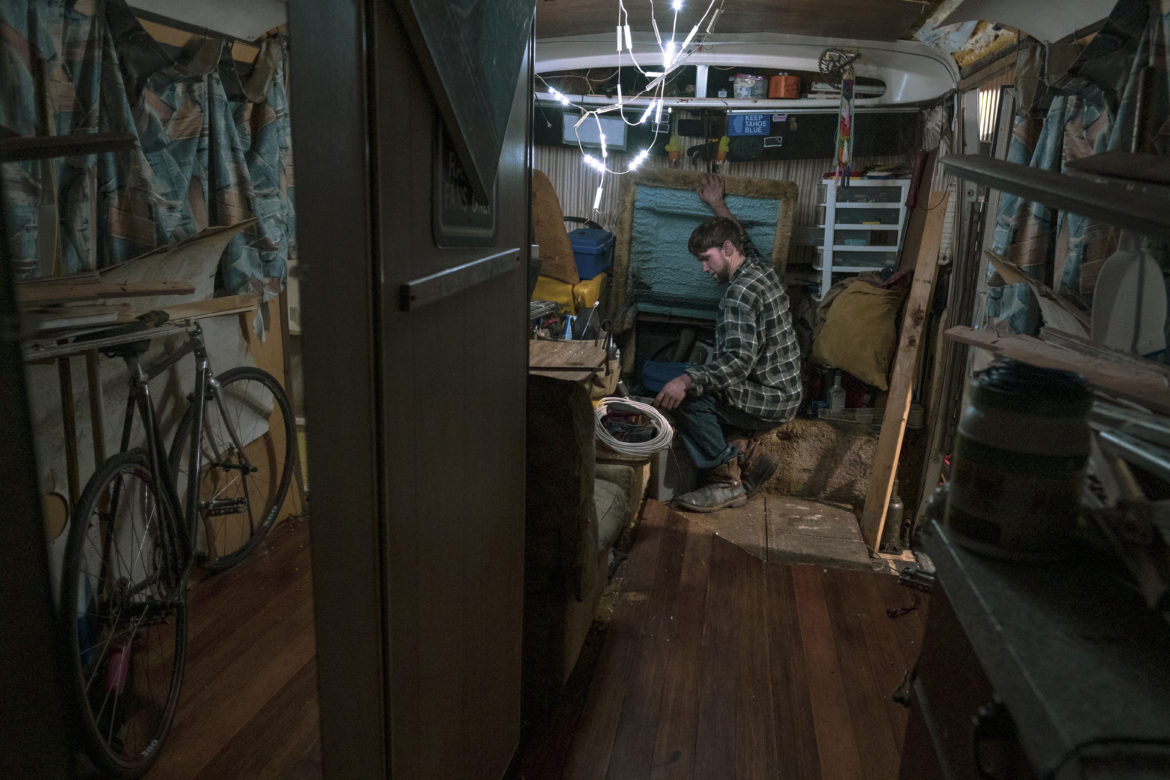
Yesica Prado / San Francisco Public Press and CatchLight Local
Before going to bed, Ryan Maddry pops open the doghouse engine cover in his RV, leaving a door ajar for his black cat to return home while he sleeps. Maddry works as a day laborer doing construction jobs in the Berkeley hills. In the evenings, he spends time repairing his RV, which needs insulation and a new ceiling. Maddry repairs the amenities inside his home as finances permit.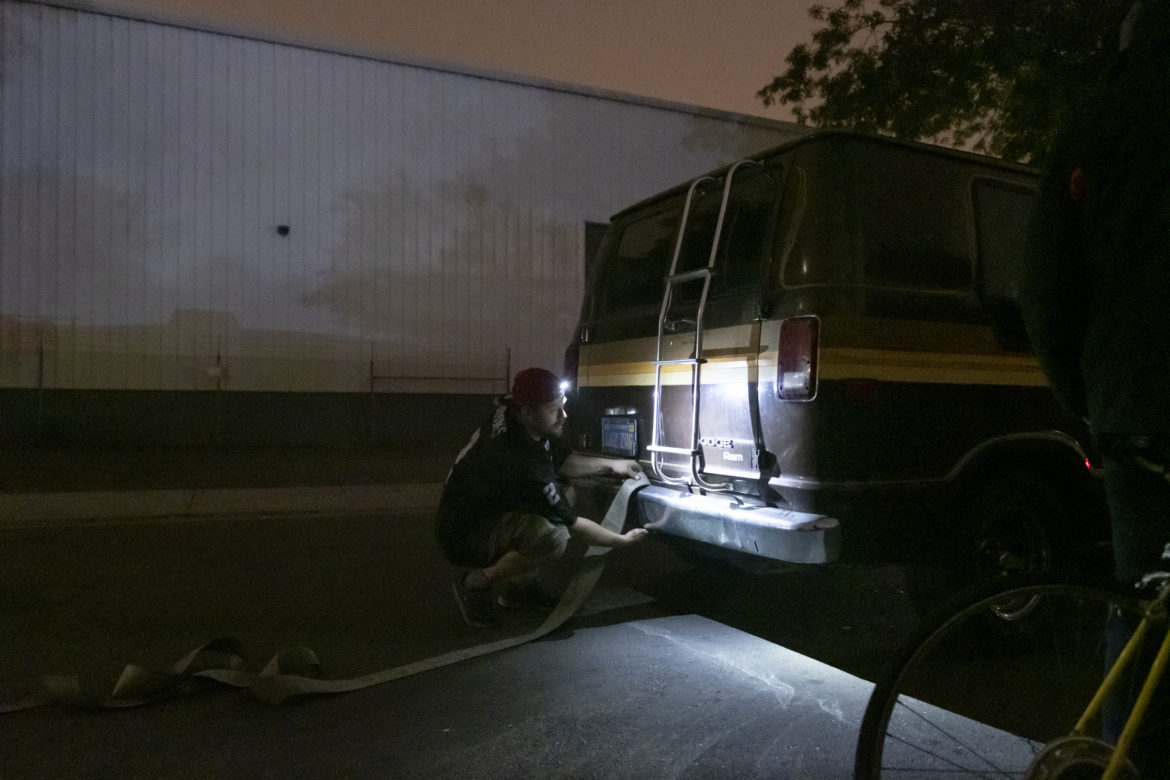
Yesica Prado / San Francisco Public Press and CatchLight Local
Chris Castle ties a tow strap to the bumper of Amber Whitson’s Dodge van on a Sunday night to help his friend Ryan Maddry, whose vehicle was red-tagged with a 72-hour notice, giving him a warning to move or be towed. But the “Ole Gal” is in disrepair and barely makes it around the corner. As a last resort, vehicle residents band together and use human force, pushing their vehicles by hand or pulling them with ropes. It is challenging to find new parking places and get resituated every three days.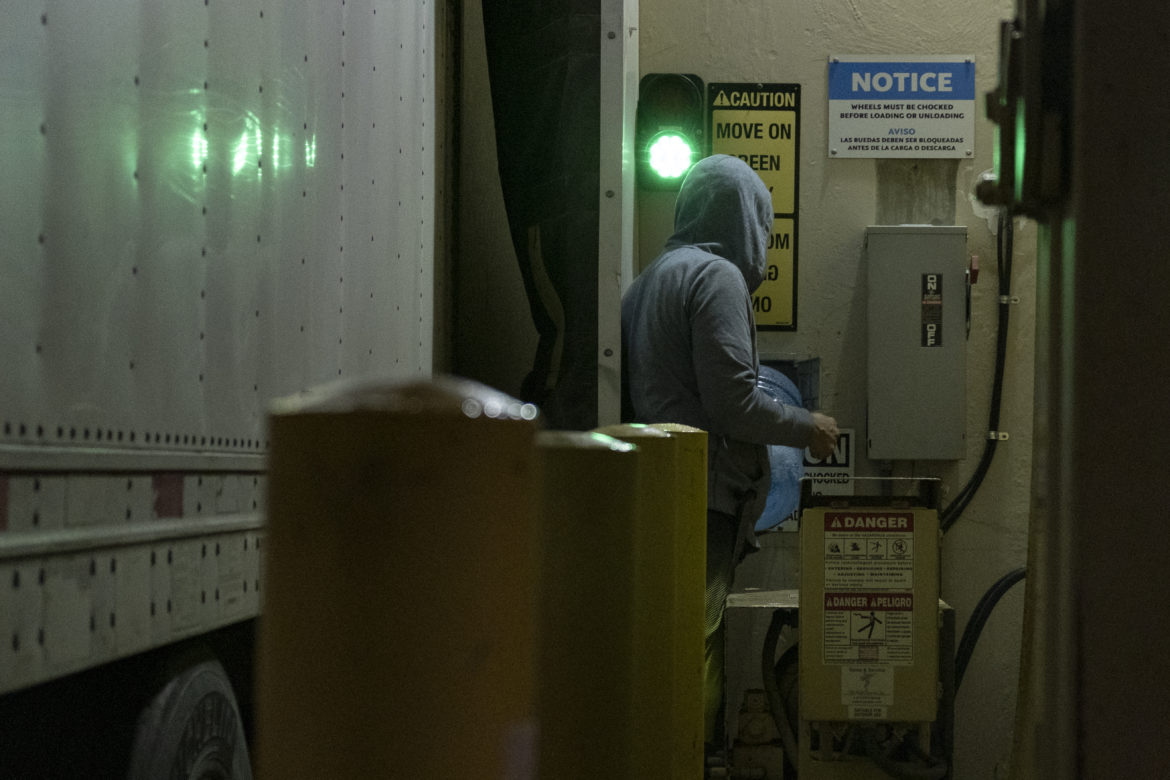
Yesica Prado / San Francisco Public Press and CatchLight Local
Late at night, vehicle residents siphon water for cooking and showering from a nearby grocery store in the Gilman District. Finding open sources for water and electricity is a daily puzzle.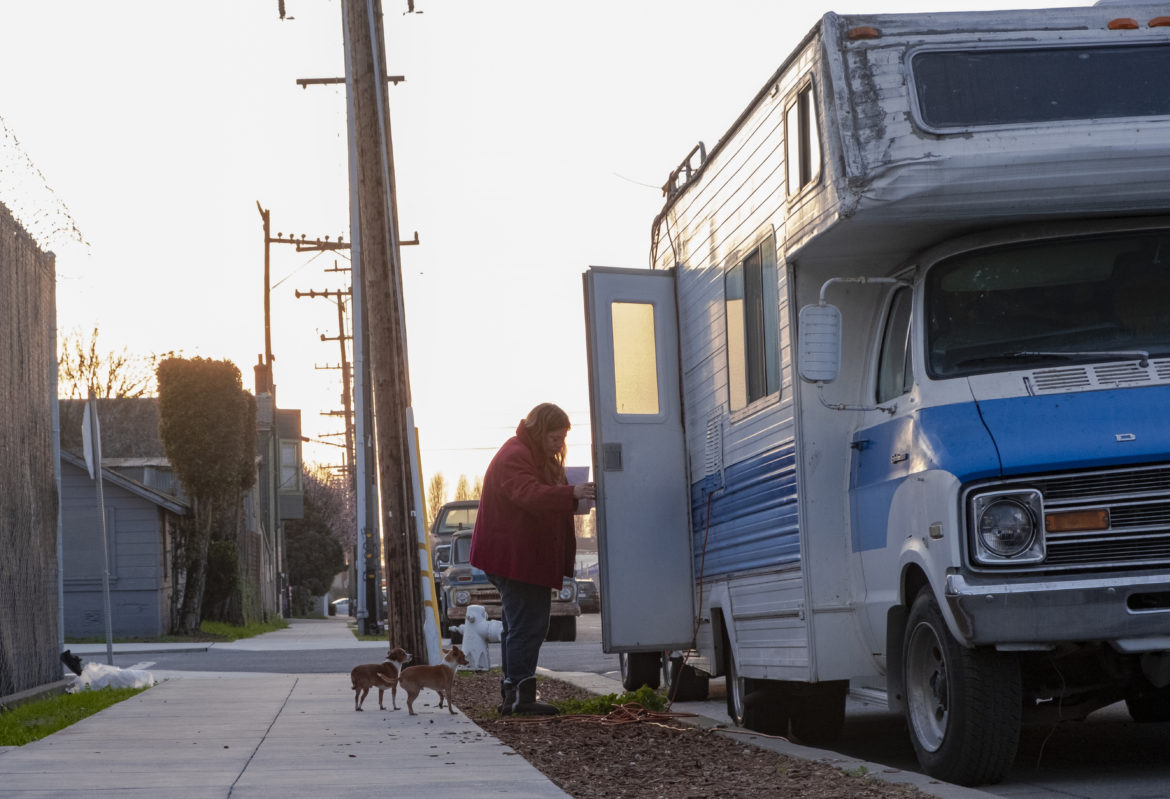
Yesica Prado / San Francisco Public Press
Janet Enos returns from a gas station with her Chihuahuas, Scrappy and Pinky. After Enos’ mother died, she lost her housing and purchased an RV. It was her first time living alone and moving away from the family home. Enos enjoys arts, crafts and cooking. “I love to feed other people,” she said. She frequently prepares food to share with next-door neighbors.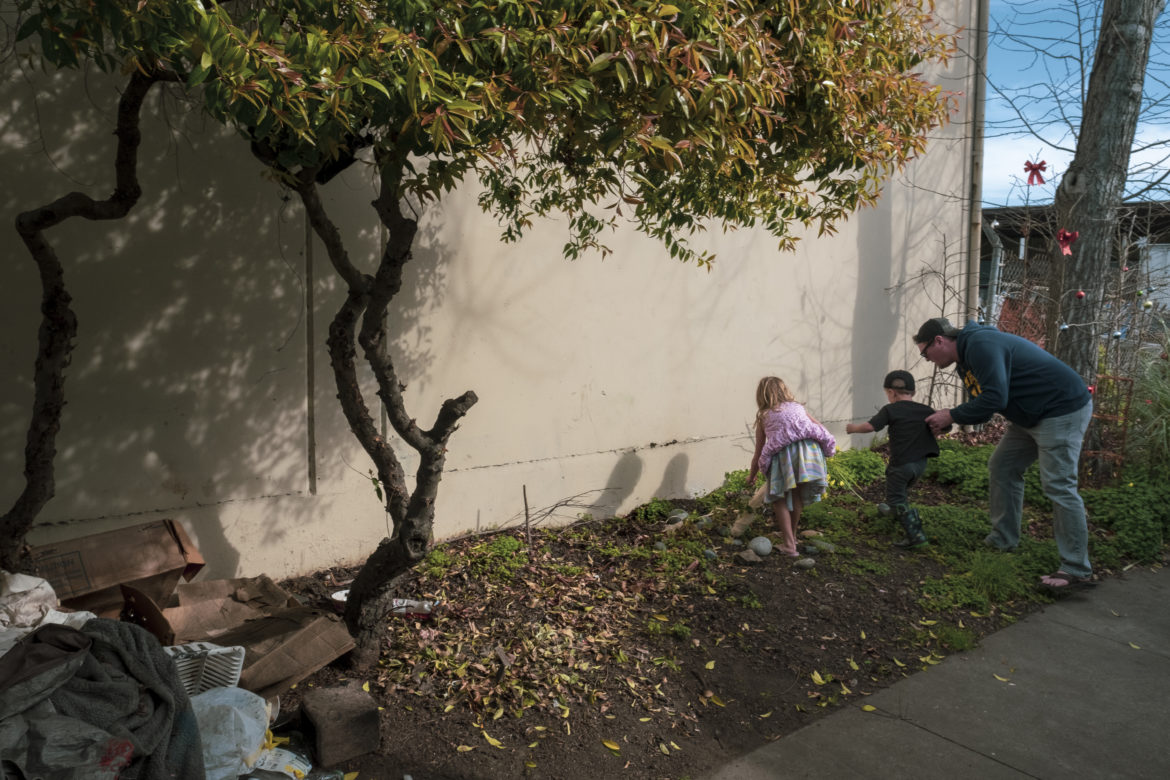
Yesica Prado / San Francisco Public Press and CatchLight Local
Children play in the green patch outside Merced Dominguez’s recreational vehicle. A father pulls his son away from her plants and garden decorations. He tells his children it is time to go and to not touch anything else.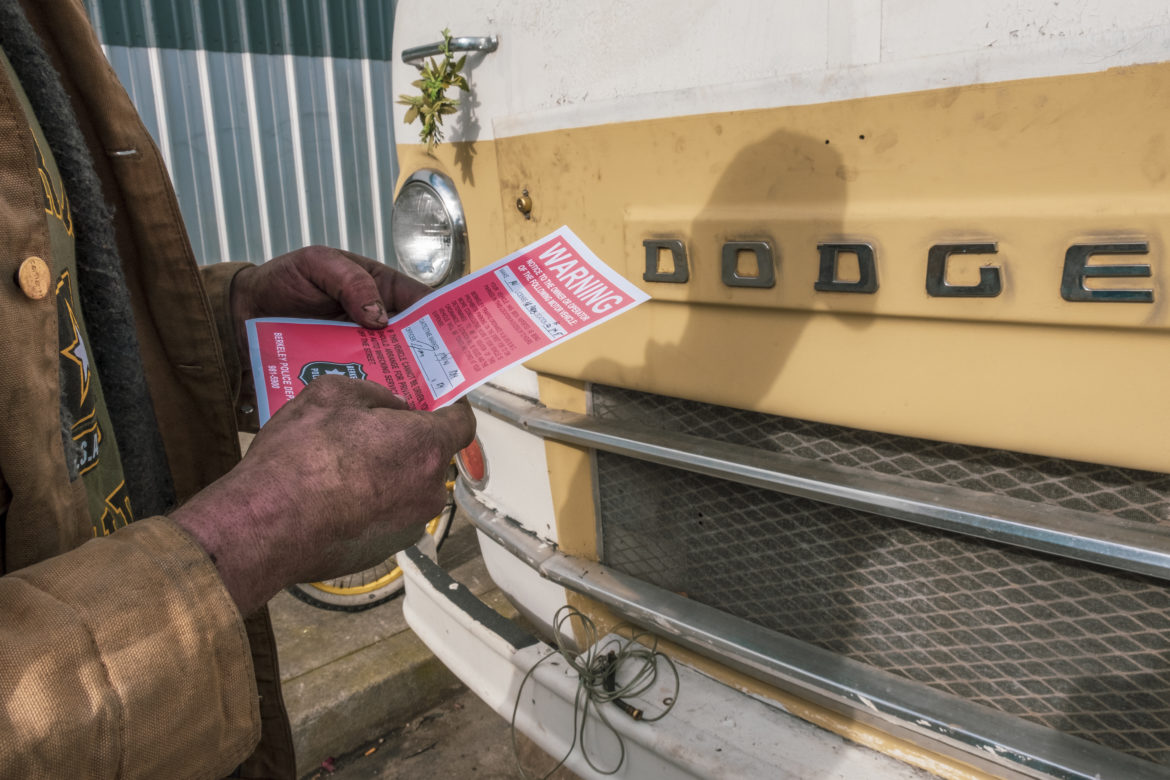
Yesica Prado / San Francisco Public Press and CatchLight Local
Ryan Maddry removes a 72-hour warning tag from the windshield of his RV parked on Eighth and Harrison streets. The notices tell vehicle residents to move every three days or risk getting towed.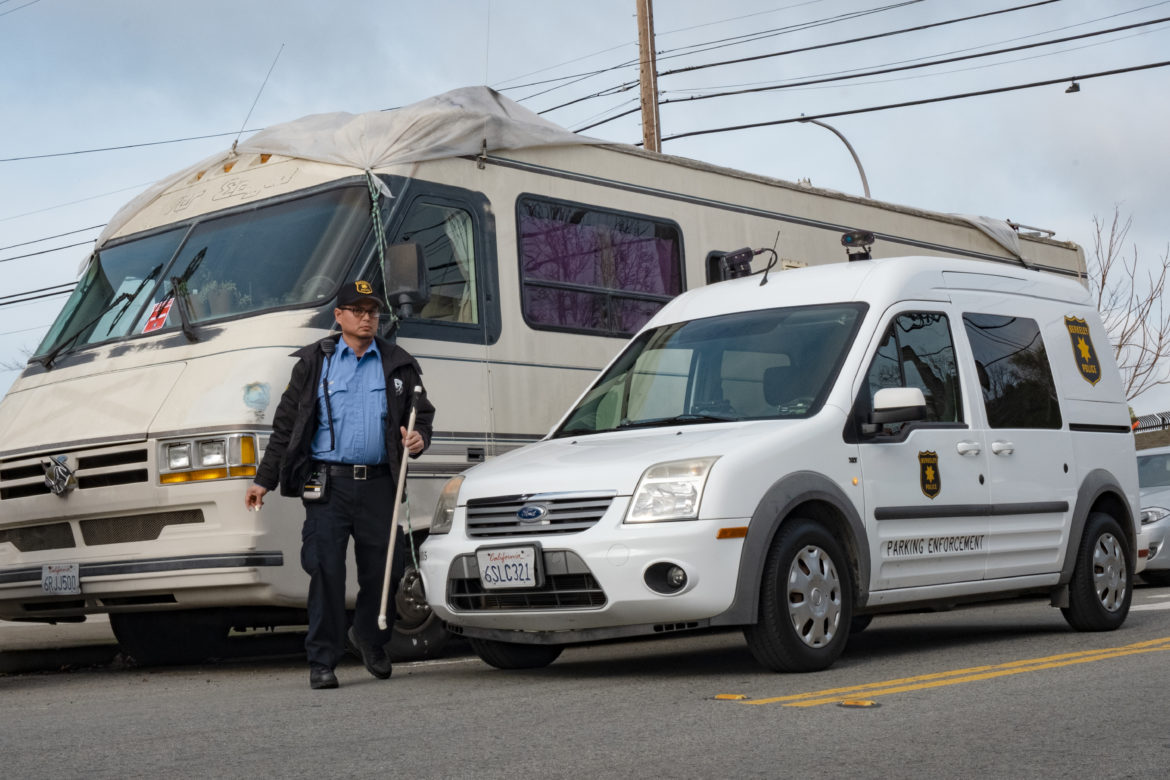
Yesica Prado / San Francisco Public Press and CatchLight Local
A Berkeley parking enforcement officer chalks the tires of a recreational vehicle so he can determine whether it stays parked in the same spot in West Berkeley for more than 72 hours. Parking enforcement appeared weekly in the winter, but vehicle residents avoided citations by moving across the street or a few feet forward to reset the parking clock.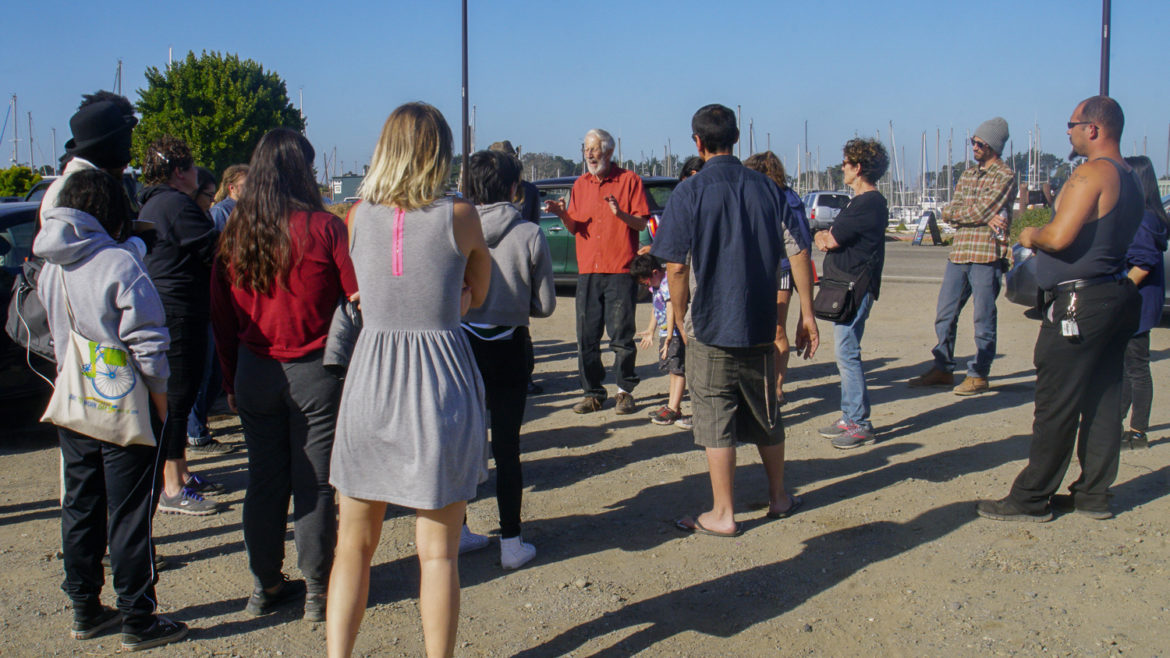
Yesica Prado / San Francisco Public Press and CatchLight Local
On Memorial Day in 2018, civil rights attorney Osha Neuman explains to vehicle residents at the Berkeley Marina that their efforts to negotiate for a sanctioned place to park there have failed, and they have to move or risk being towed. Waterfront staff posted construction notices on the meadow lot, forcing dozens of vehicle dwellers to relocate to other parts of the city.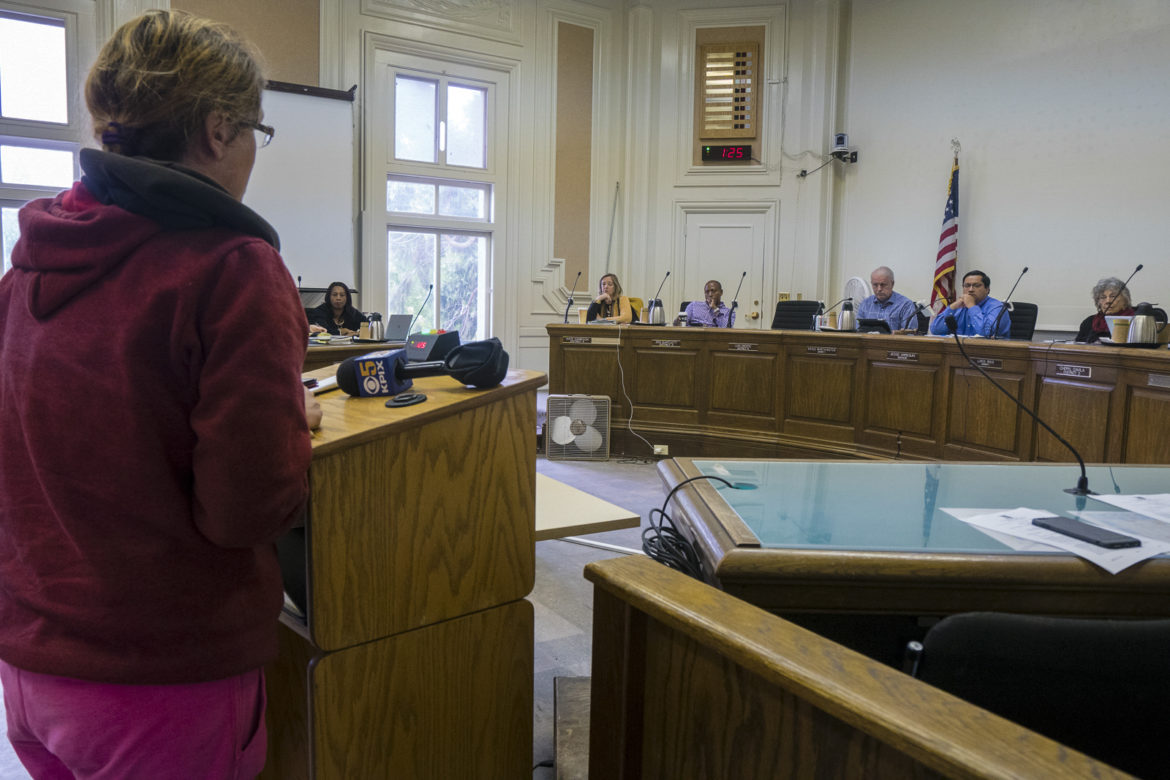
Yesica Prado / San Francisco Public Press and CatchLight Local
Shabon Bockover addresses the Berkeley City Council meeting on July 10, 2018, asking for a safe parking place at the vacant Hs Lordships restaurant parking lot. The Bockover family hopes to find stable housing before their children return to Berkeley Arts Magnet School in the fall. One option is to return to live with family in Sacramento, but that would mean Chris Bockover would have a four-hour commute round trip to San Francisco for work.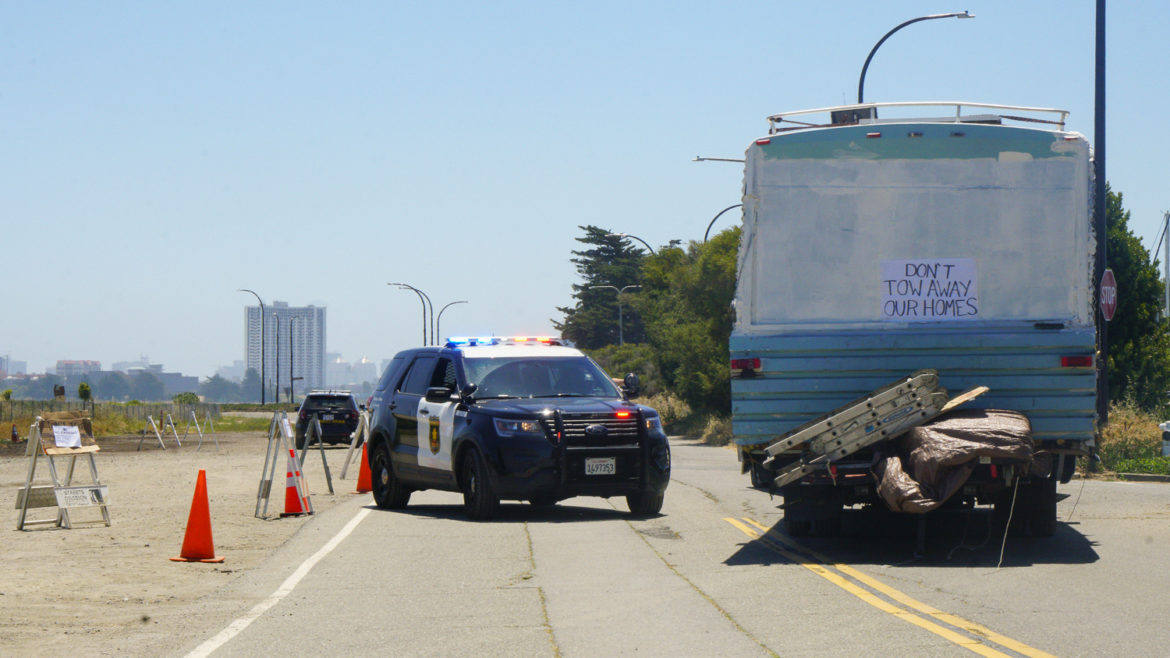
Yesica Prado / San Francisco Public Press and CatchLight Local
The engine roars as Chris Bockover pulls Naomi Gonzalez’s vehicle out of a dirt lot. It is the last motorhome moved because it isn’t running. “The rats have eaten all the wiring during the winter and now the motorhome doesn’t start,” says Gonzalez, who lives in her motorhome with her husband, Paul Schrager, and 5-year-old son, also named Paul. Bockover uses a metal chain to tie the chassis to his pickup and pull the motorhome out, but the chain breaks. After much effort, the team is able to tow Gonzalez’s motorhome into the parking lot of Hs Lordships, a restaurant. “Yeah! No brother is left behind!” exclaimed Bockover, sharing a high-five with Schrager.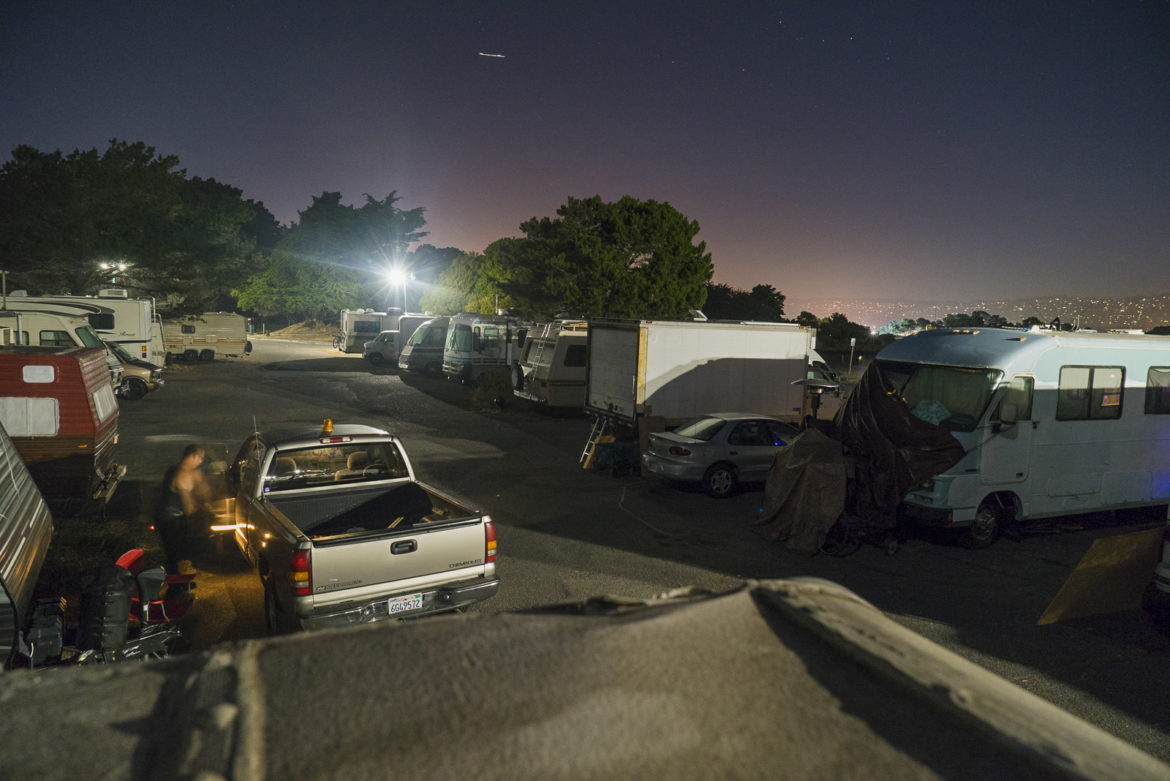
Yesica Prado / San Francisco Public Press and CatchLight Local
After an eventful day, Chris Bockover heads out for work for one night in early June. He has the graveyard shift, and won’t return home until 8 a.m. He jokes about not having any days off, since every day there is something to do: work, watch the children, fix the rig and smile. Chris is known for pulling innocent pranks on neighbors that often cheer them up, at least for the day. He says things like, “hey, you dropped your pocket.” And of course even though they’ve heard it before, someone always looks down. The Bockovers are a friendly family, and the courtyard outside the trailer is a social hub, with neighbors often seeking advice or bringing goods to share with their children.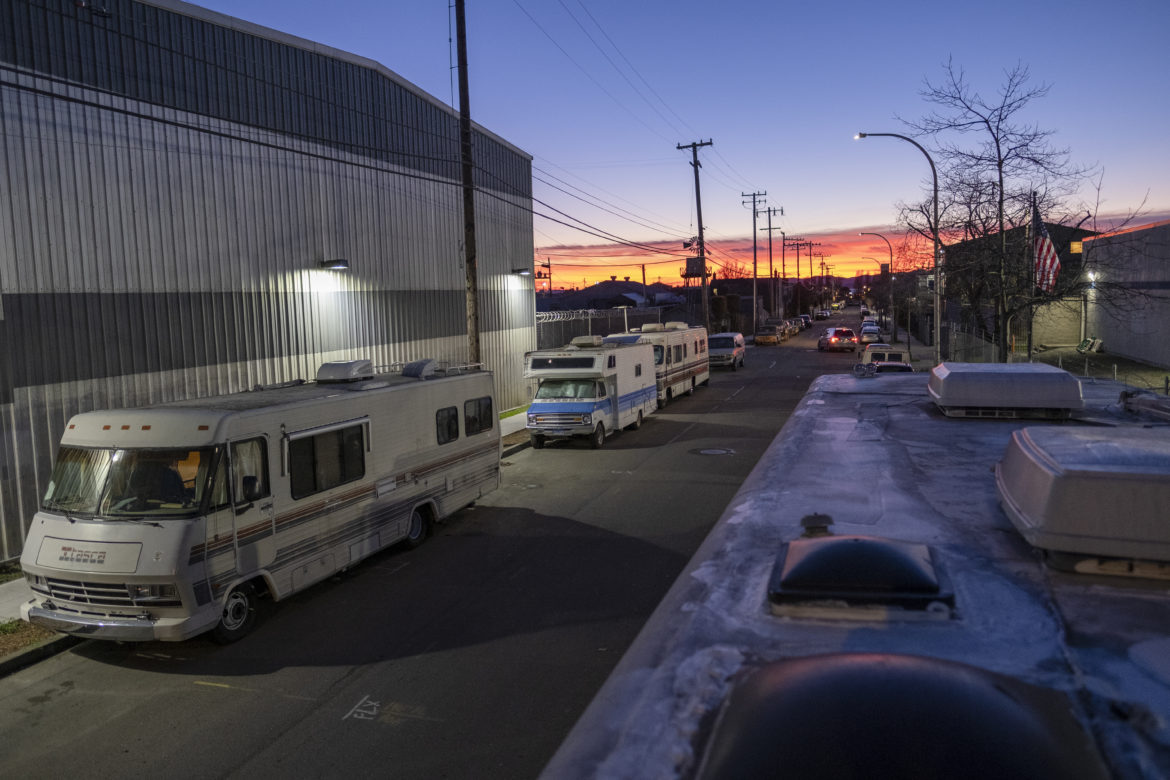
Yesica Prado / San Francisco Public Press and CatchLight Local
Dusk falls on seven vehicular homes at Eighth and Harrison streets in Berkeley’s Gilman District. For over a year, a vehicular community called Friends on Wheels has found refuge at this intersection, living together for safety and companionship. While searching for safe parking spots and the amenities of everyday life, vehicular residents met and banded together at the Berkeley Marina. But as the community of vehicle dwellers grew, their risk of being towed and receiving further citations forced people to leave. Vehicle residents had to find another safe place to settle, and so they found a resting spot on the industrialized streets of West Berkeley.This story is part of “Driving Home: Surviving the Housing Crisis” and was produced in collaboration with the Bay Area visual storytelling nonprofit CatchLight through its CatchLight Local Initiative. As a CatchLight Local Fellow at the San Francisco Public Press, Yesica Prado examined the culture of vehicle living in San Francisco and Berkeley. Her fellowship work has been featured by the Yerba Buena Center for the Arts and by the Artists Against an #Infodemic Campaign, which aims to improve access to locally relevant public health information. The CatchLight Local Initiative is funded by the Kresge Foundation, The GroundTruth Project, the Facebook Journalism Project, the Neda Nobari Foundation and the Lisa Stone Pritzker Family Foundation.
